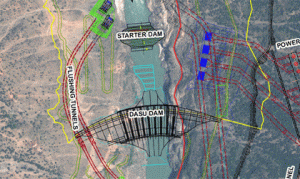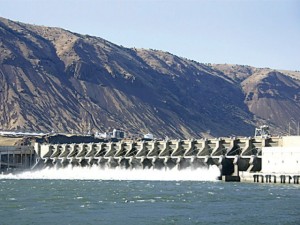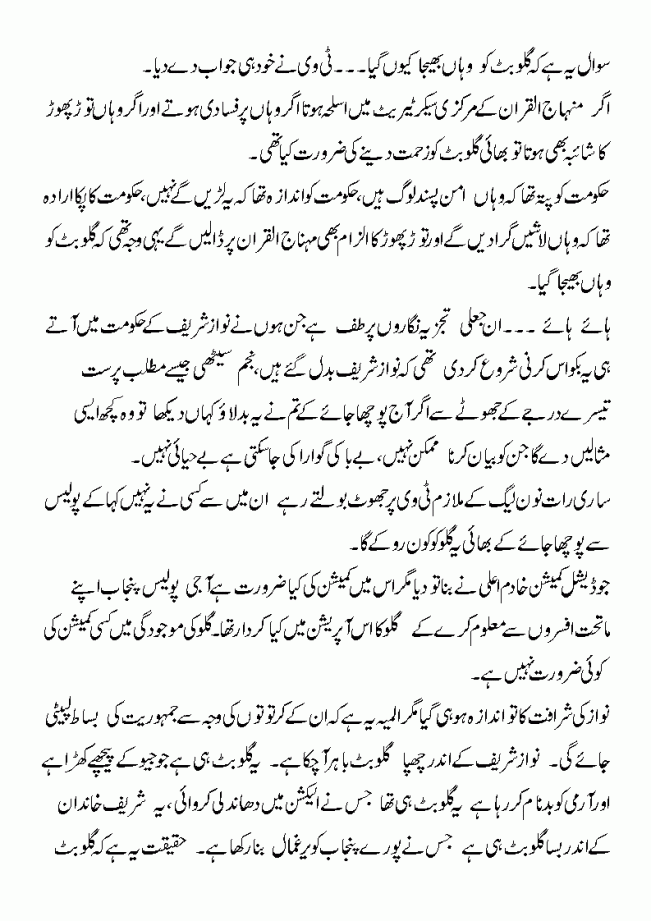
Special Report by Javed Mahmood/Corporate Ambassador/ISLAMABAD
Diamir Basha Dam is emerging as another mega scam in which billions of rupees have been siphoned off through purchase of private land at extra-ordinary and unbelievably high rates. In several cases, the payment of one-acre of land for the Bhasha Dam had been made in the range of 10 million rupees (one crore for one acre), whereas the actual rate of the land, consisting of mountains and rocks, is hardly one lakh rupees (0.1 million rupees).
Chairman Sind Tas Water Council of Pakistan Engr. Muhammad Suleiman disclosed this ‘Mega Dam & Mega Scam’ issue in an interview to Corporate Ambassador on Sunday (Sept 13, 2015).
Three governments are involved in this mega scam _ Pervez Musharraf’s regime, PPP government and now PML(N), adding the major chunk of corruption made in land purchase was done by the PPP government.
More or less 80 billion rupees were paid to different persons for the purchase of land for Bhasha Dam by the PPP regime while PML(N) government believed to have paid 20 billion rupees from the total package of 100 billion rupees allocated for the purchase of land and rehabilitation of about 4,000 families affected by the project. Pervez Musharraf regime made a few billion rupees payment and it carries minimum responsibility of this mega scam.
“We have reports of exaggerated payments to several persons that you can imagine from the fact that one-acre of land worth 10,000 to 50,000 rupees had been purchased for 10 million rupees,” Engr. Suleiman said.
In my opinion this is a mega scam of mega dam that need to be probed by the authorities concerned to retrieve the looted public money.
Chairman of the Sind Tas Water Council said the present government was least interested in the construction of mega dam as it don’t want to annoy the foreign powers that are against the construction of a big dam that can change the fate of Pakistan and the people of Pakistan.
Since July 2013 the PML(N) government had neither completed the purchase of private land for the dam nor allocated funds to start its construction on fast-track basis, he said.
About 13 billion dollars are needed to build this dam out of which five billion dollars would be spent on the construction of 200-kms long road between the mountains and three billion dollars on the installation of transmission lines and the rest of the amount would be utilized on the construction of remaining projects of the dam, he said.
In a recent interview to this writer, Asian Development Bank Country Director Werner Leipach said that Pakistan must build one dam to expand water storage capacity that would promote irrigation, produce low-cost electricity and ensure economic growth and prosperity in the country.
He, however, said that the government don’t have enough financial resources to build this mega dam and the donors may not support it because of its location as the dam also falls into the territory that is disputed.
He did not name India, but sources said the World Bank officials have asked the government to get No Objection Certificate from India to build Bhash Dam.
For example, the PML(N) government organized a conference in Washington to line-up financing for this dam but the World Bank sabotaged it by linking its financing with the risk assessment survey of the project that involves obtaining an NOC from India.
Chairman Sind Tas Water Council of Pakistan further stated that the government had signed $34 billion energy projects with China under the China-Pak Economic Corridor project, but the rulers have not bothered to include Bhasha or Dasu Dam in any of the CPEC projects that could produce low-cost electricity and support the agricultural and economic development in future.
PM orders probe into Bhasha Dam land corruption reports
A few months ago Prime Minister Mian Muhammad Nawaz Sharif has ordered inquiry into the alleged corruption in the purchase of private land for the dam. However, no body knows the fate of the inquiry or its findings and this mum of the government is supporting reports of corruption in this mega project.
16 Years gone, Bhasha Dam land still not purchased
 The present government of PML(N) has paced up the land acquisition process, but its first two years have gone (out of 5-year term) and still the private land purchasing is going on. How much serious is the PML(N) government in this project it can be guessed from the fact that it is allocated less than one percent of the total cost of the project in each budget for the dam.
The present government of PML(N) has paced up the land acquisition process, but its first two years have gone (out of 5-year term) and still the private land purchasing is going on. How much serious is the PML(N) government in this project it can be guessed from the fact that it is allocated less than one percent of the total cost of the project in each budget for the dam.
In other words, a dam that was to be completed in 14 years at a cost of $13-14 billion US dollars, its land could not be purchased in 16 years. This is the way our rulers solve the energy problem that has paralysed the business and social life.
On several occasions the Federal Minister for Finance Senator Muhammad Ishaq Dar has vowed to build two big dams _ Dasu and Basha Dams to meet the shortage of water and electricity.
The PML(N) government arranged conference in Washington to get financial support from the donors and the investors to build Diamir Bhasha Dam.
But the World Bank foiled that conference by giving the verdict that the government should carry out the risk assessment of the project that also needed an NOC from India. Just imagine, can India give Pakistan an NOC to build a dam that can change the future scenario of Pakistan.
Experts often say every year that if Pakistan builds one big dam, the country can overcome the annual feature of devastation of floods.
Regarding the Dasu Hydro Power Project the World Bank had approved $588 million IDA loan to support the government to build Dasu Dam, a run of the river hydro-project to be built on Indus River. The project would produce more than 4000 MWs of electricity after completion. The Dasu Dam is expected to be completed in 7 years at a cost of 7 to 8 billion dollars. So far the World Bank had provided only $50 million to Pakistan for this project and now land acquisition is going on at a very disappointingly slow pace.
Interesting to note is that the experts in WAPDA have strongly proposed the construction of Bhasha Dam that will not only store water for agricultural purposes but also produce 4,500 MWs of electricity.
WAPDA officials are of the opinion that Dasu Dam is run-of-the river dam that will not store water and it will produce electricity only from the river water.
WAPDA experts have told the government and the WB that Bhasha Dam is expensive and it will take more time than Dasu, but its advantage is that it would overcome water shortage in Pakistan that would ultimately support agricultural and economic growth in the country. But the World Bank had supported Dasu Dam/Hydro Power Project.
Dasu Hydropower Project has the potential of producing 4320MW electricity which will be developed in two phases. Under Phase-I, 2,160MW electricity will be produced which will be extended to 4,320MW in future under Phase-II.
BHASHA DAM
Bhasha Dam is a gravity dam, in the preliminary stages of construction, on the River Indus in Gilgit-Baltistan, Pakistan. Its foundation stone was laid by Prime Minister Yusuf Raza Gilani of Pakistan on 18 October 2011. Upon completion, Diamer-Bhasha Dam would be the highest RCC dam in the world. The dam site is situated near a place called “Bhasha” in Gilgit-Baltistan’s Diamer District, hence the name.
Upon completion, Diamer-Bhasha Dam would (i) produce 4,500 megawatts of electricity through environmentally clean hydropower generation; (ii) store an extra 8,500,000 acre feet (10.5 km) of water for Pakistan that would be used for irrigation and drinking; (iii) extend the life of Tarbela Dam located downstream by 35 years; and (iv) control flood damage by the River Indus downstream during high floods.
It will have a height of 272 meters spillway with fourteen gates each 11.5 m x 16.24 m. The gross capacity of the reservoir will be 8,100,000 acre feet (10.0 km), with a live storage of 6,400,000 acre feet (7.9 km). Two underground power houses are being proposed, one on each side of the main dam having six turbines on each side with total installed capacity 4500 MW.
In January 2006, the Government of Pakistan announced the decision to construct 5 multi-purpose storage dams in the country during next 10–12 years.
According to the plan, Diamer-Bhasha Dam project was proposed in the first phase and in November 2008, the Executive Committee of National Economic Council formally approved the project. Council of Common Interests Pakistan, a constitutional body representing the provinces, also approved the construction of the dam. The Prime Minister of Pakistan laid the foundation stone of the project on 18 October 2011.
India’s NOC, construction & cost of Basha Dam: In November 2008, the cost of the Diamer-Bhasha dam was estimated at $12.6 billion, now delay in the construction of the dam had raised its cost to over $14 billion. The World Bank has linked the construction of this dam with the issuance of a No-Objection Certificate (NOC) from India _ which, in other words, is nothing but a technical way to say ‘no to this project’.
On 20 August 2013, Finance Minister of Pakistan Senator Ishaq Dar claimed to have convinced the World Bank (WB) to finance the Diamer-Bhasha Project without the requirement of NOC from India, but this too did not materialize and the government had now started work on the stage-1 projects of Dasu Dam at a cost of $4.8 billion. The first phase of this project would be completed in five years time and it will generate 2100 MWs of electricity. Let us see whether or not the present government makes serious efforts in building the Dasu project in its remaining three years tenure.











